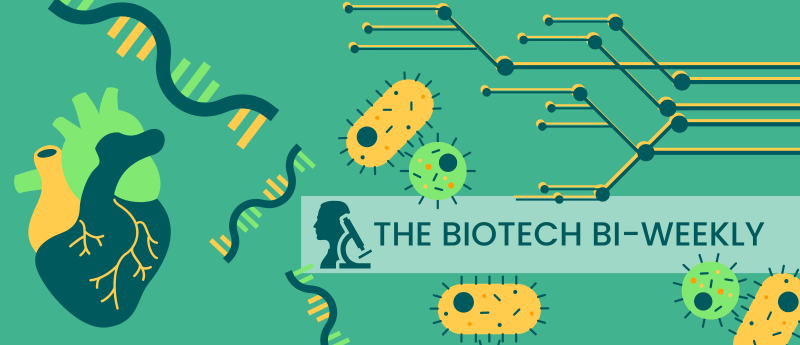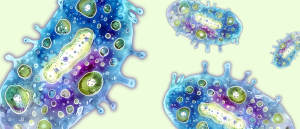The biotech bi-weekly: nucleic acid purification, metabolic heart failure research and AI-designed bispecific binding proteins

What’s new in the biotech world?
In this listicle, we highlight recent product launches, partnerships and company events ranging in topic from efficient nucleic acid purification and PCR for beverage analysis, through to accelerating metabolic heart failure research and integrating next-generation large-particle assays into your flow cytometry workflows.
Products
Efficient mRNA capture and purification
Cytiva (MA, USA) has launched its Fibro dT platform for mRNA capture and purification processes. Because of its unique structure and design, it can handle large amounts of RNA efficiently and speeds the purification process by avoiding the need for the RNA to move into tiny resin beads. Emmanuel Abate, President of Genomic Medicine at Cytiva, commented: “The industry has long sought efficient methods to capture valuable molecules, minimizing waste and maximizing yield. Fibro dT achieves this quickly and cost-effectively, ultimately benefitting patients in need of advanced therapies.”
Read the full release here >>>
PCR for the detection of spoilage organisms in beverages
To support the quality of beverage products, Thermo Fisher Scientific (MA, USA) has introduced the Thermo Scientific™ SureTect™ Beverage Spoilage Multiplex qPCR Assay, an industry-first all-in-one quantitative PCR-based test developed in collaboration with Coca-Cola Europacific Partners. Now part of the Thermo Scientific SureTect PCR System, the assay offers early and accurate detection of spoilage organisms earlier in the production process and has wide applicability across the beverage testing industry.
Read the full release here >>>
Next-generation nucleic acid purification
Primerdesign (Manchester, UK), a company focused on the design, manufacture, validation and supply of real-time PCR kits and reagents, has announced the launch of its exsig® Mag RapidBead Pro Extraction kit. The next-generation magnetic bead-based kit can be used to extract high-quality DNA and RNA from diverse sample types. The streamlined and adaptable protocol enables efficient nucleic acid purification without compromising on yield and purity.
Read the full release here >>>
 Quantum questions have algorithmic answers: navigating a drug discovery network
Quantum questions have algorithmic answers: navigating a drug discovery network
In this interview, Namshik Han – Professor at Yonsei University and leader of the AI discovery group in the Milner Institute at the University of Cambridge – explains quantum algorithms with a London Tube analogy, how they can be applied to benefit drug discovery, and shares his advice for researchers wanting to launch their own startups.
Partnerships
Accelerating innovation in metabolic heart failure research
Agilent Technologies Inc. (CA, USA) announced the signing of a five-year Memorandum of Understanding with National Heart Centre Singapore (NHCS) to accelerate innovation in metabolic heart failure research, one of the most complex and underserved areas in cardiovascular medicine. Under this agreement, Agilent and NHCS will combine their expertise in human cardiac organoids using human-derived heart tissues with cutting-edge analytical technologies, including Agilent’s latest Seahorse XF Flex Analyzer, which expands real-time metabolic analysis into 3D tissues and organoid workflows to investigate metabolic drivers of heart failure.
Read the full release here >>>
Partnering for AI-designed bispecific binding proteins
Bio-Techne Corporation (MN, USA), a provider of life science tools, reagents and diagnostic products, has announced a licensing agreement with Monod Bio (WA, USA), a biotechnology company spun out from the Nobel Prize-winning David Baker lab at the University of Washington, Institute for Protein Design (WA, USA). The agreement grants Bio-Techne exclusive commercial rights to a specific subset of Monod’s NovoBody™ Duo molecules, a new class of AI-designed bispecific binding proteins.
Read the full release here >>>
Sponsoring the Microbes in Wastewater Symposium 2026
Zymo Research Corporation (CA, USA), a molecular biology and pathogen detection company, is sponsoring the Microbes in Wastewater Symposium 2026, taking place 15–16 January 2026 at the Balboa Bay Resort in Newport Beach (CA, USA). The annual event brings together leading researchers, government agencies and industry partners to advance scientific understanding and collaboration in wastewater-based epidemiology and microbial surveillance.
Read the full release here >>>
 Targeting ABC to tackle AMR: taking advantage of bacterial membrane proteins
Targeting ABC to tackle AMR: taking advantage of bacterial membrane proteins
We sat down with Heather Pinkett – Professor in the Department of Molecular Biosciences at Northwestern University and President of The Protein Society – to learn more about ABC transporters and what targeting them could mean for combatting antimicrobial resistance.
Publications and webinars
The sequencing technology informing antimicrobial resistance reduction strategies
In recognition of antimicrobial resistance (AMR) week, observed from 18–24 November every year, Illumina (CA, USA) shared an article highlighting how their technology is facilitating breakthroughs in the fight against AMR.
Armed with Illumina whole-genome sequencing (WGS) technology, next-generation sequencing (NGS) technology and library prep kits, scientists can better inform AMR reduction strategies. WGS and NGS tools detect and characterize pathogens and AMR genes and markers, enabling health care systems to predict phenotype resistance, monitor patterns of resistance, and rapidly detect it. Microbial genomic data also helps researchers gain insight into the efficacy of antimicrobial drugs, informing the development of new medications to help improve patient care.
Read the full article here >>>
Seamlessly integrate next-generation large-particle assays into your flow cytometry workflows
Advances in cell therapy, cancer biology, and immunology increasingly require analytical tools that can accommodate complex models and functional assays. Emerging applications involving large cells, aggregates, and “lab-on-a-particle” platforms demand reliable characterization and sorting of these samples. Conventional flow cytometers have challenges with larger particles such as clogging, low sort efficiency and reduced recovery.
In an upcoming webinar, Sony Biotechnology (CA, USA) will introduce the new Large Particle Sorting Upgrade for the SH800 and MA900 Cell Sorters, designed to expand compatibility with large and/or structurally complex sample types. Learn how this new capability enables researchers to seamlessly integrate next-generation large-particle assays into routine flow cytometry workflows.
Advances in antibody discovery
Antibodies play a central role in modern medicine, serving as both therapeutics and as essential tools in diagnostics. While antibody generation against soluble proteins is well established, discovering binders to complex, multipass membrane proteins such as G-protein–coupled receptors (GPCRs) remains one of the greatest technical challenges in the field.
An upcoming webinar from Bio-Rad (CA, USA) will introduce an efficient process to stabilize membrane proteins in their native forms and share insights into phage display and strategies for panning directly against stabilized GPCRs, including methods to preserve key extracellular epitopes and reduce off-target binding.